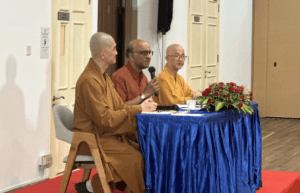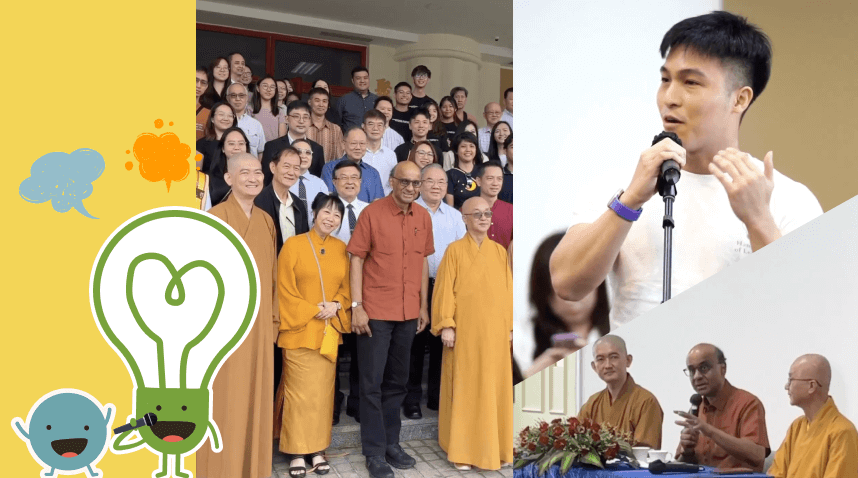Editor’s note: During this Presidential Election, HOL is dedicated to fostering understanding and learning from a variety of interactions, rather than endorsing a particular political figure. We maintain an impartial stance and do not advocate for any candidate. Quotations have been abridged for clarity and grammar.
In a world that rushes towards success, often sidelining personal growth, the pursuit of wisdom becomes vital. A recent profound exchange with Mr. Tharman Shanmugaratnam bestowed precious insights upon young Buddhist leaders. He, of course, could not resist talking about Orh Nee. Here are five valuable pieces of wisdom that deeply resonated.
Ps: We of course did reels about it right here

Nurturing Joy in Volunteering
During the Q&A, Buddhist leaders noted a struggle in recruiting volunteers, citing rising tech and other distractions for youths.
Mr. Tharman replied by underscoring a vital point: the essence of joy. Amidst the purpose, the camaraderie and joy among volunteers holds equal importance.
“Volunteers are very often motivated by the friendship with fellow volunteers….what you are doing of course must have a purpose but you must find it joyful to do so. Usually, the volunteers you are meeting would like to have fun together after doing some volunteer work.” Mr Tharman shared.
This revelation led to an introspective pause—do we sometimes overlook the joy of service amidst our pursuit of goals?
Often, groups are eager to onboard new volunteers to lead without first building a relationship. That was something that had to change in a relatively goal-oriented society like Singapore where goals > people.
Steering clear of burnout

A DAYWA leader, Angela, shared how she saw a common problem of burnout when interacting with other organisations’ Buddhist leaders and asked for tips from Mr Tharman’s experience in the volunteering scene.
Mr. Tharman’s solution?
Embrace variety.
He cautioned against diving too deeply into a solitary volunteer role, which might lead to tunnel vision. To ward off burnout, keep the mind engaged through diverse experiences.
“In my own experience, I’ve always done something at any point in time. But usually, I’m not doing the same thing all the time…..So I might be doing one thing and another thing on another day…the variety also helps me to keep my mind more interested in things outside one area.” – Mr Tharman shared.
A healthy balancing act between our commitments as volunteers keeps us from burning out as something that energises us now may not be the thing that energises us tomorrow. Managing our impermanent relationships with volunteering is key.
Cultivating Interest through Cultural Bridges
One suggestion from Mr Tharman during the dialogue was the use of culture as a means to attract people to Buddhism. The richness of Buddhist art and calligraphy, for instance, can serve as engaging entry points to the teachings of Buddhism.
“We must find a new way of making it enjoyable and interesting. For example, if you think of Buddhism there’s Buddhist art. It’s very interesting. There’s a Buddhist school even within calligraphy. Different aspects of culture which are Buddhist influence. Although you’re not talking about Buddhist teaching immediately but developing and understanding culture makes it interesting.”
This approach, according to Mr. Tharman, can be a way to make Buddhism more appealing to a younger audience. It could also be a way to encourage more people to explore spirituality and cultivate mindfulness.
Among Buddhist leaders, there was a quiet reflection that groups tend to give a ‘download’ of the teachings with no nuances catered to the listener. This makes the entry into the Dhamma a bumpy one.
One upcoming event I thought fitted nicely with Mr Tharman’s suggestion was that of watching Buddhist films right in the heart of Orchard Road. THISBFF Buddhist Film Festival provides us with an easy and intriguing entry into the world of Dhamma.
Weaving Harmony through Historical Understanding
In response to a query about religious stigmatisation, Mr. Tharman underscored the importance of learning about the common ground between different religions. He suggested that gaining a historical understanding of diverse faiths could foster more open-mindedness and reduce religious competition.
By delving into historical overlaps between Abrahamic faiths and Dhammic traditions, we nurture a broader, more open-minded perspective.
“That itself will make people more open-minded. You have your own religion but you’re not so worried about other religions because there’s something similar in the other religion.”Studying history shows the common thread of humanity that we share. This reminded us too that where we cannot seek consensus, we can agree to disagree.

CR: Today
The Power of Compassion and Respect
In the dialogue, Tharman highlighted the importance of compassion and respect in fostering a better society. In his opening statement, he mentioned ‘respect’ 10 times, highlighting his fondness for the value and the word.
He shared that while economic development is easy to measure, it is “not so easy to measure our relationship to each other. It is very hard to measure but very important how we measure our compassion and thoughtfulness with each other”
In the conversation, Mr. Tharman highlighted compassion and respect as the cornerstones of a better society. These virtues, deeply regarded in Buddhism, hold universal relevance. Compassion enables us to connect with others, while respect paves the way to valuing diverse viewpoints.
In a wrap
In a dynamic 90-minute exchange filled with insightful queries and illuminating responses, the discourse with Mr. Tharman underscored the significance of compassion, mindfulness, and respect in navigating the intricate maze of modern existence.
Through empathy and understanding, we can collaboratively build a society where happiness and fulfilment are within reach for all. Benjamin Franklin’s wisdom rings true:
“The gateway to wisdom is an acknowledgement of our own ignorance.”


